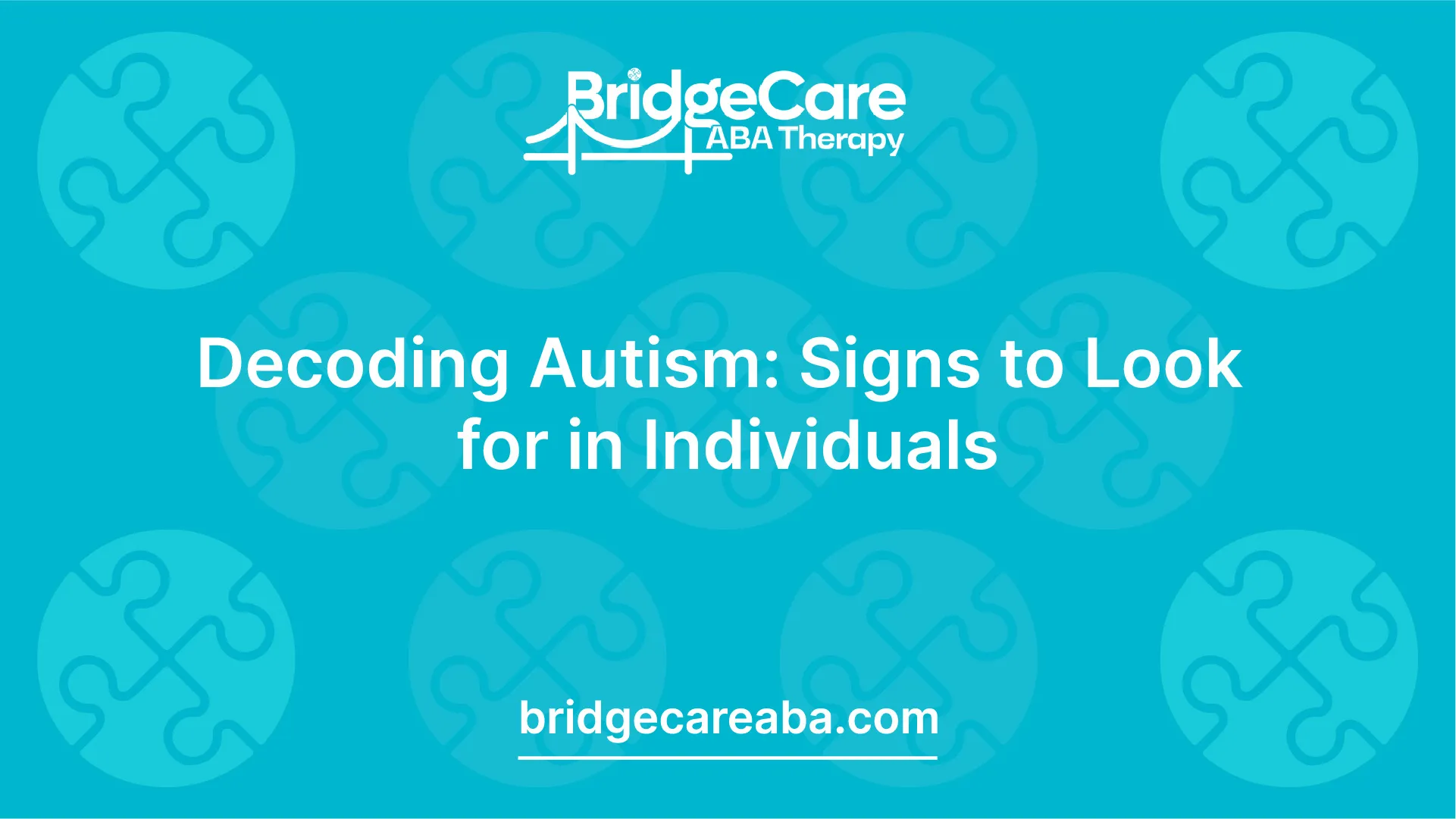How peer relationships can improve with Autism Spectrum Therapies
How peer relationships can improve with Autism Spectrum Therapies
Blog Article
Secret Symptoms And Signs to Recognize in Individuals With Behavioral Autism
When you experience a person with behavioral autism, recognizing vital indicators and signs and symptoms is important. Additionally, sensory level of sensitivities can lead to overwhelming experiences.
Obstacles in Social Communications
When you connect with someone on the autism range, you might see they battle with social cues and interaction. These obstacles can make social interactions really feel overwhelming for them.
When they do involve, they might talk about their interests in excellent information without seeing if you're interested. Understanding these challenges can help you come close to interactions with compassion and persistence, promoting an extra comfy environment for both of you.
Difficulty With Verbal and Non-Verbal Interaction

Non-verbal interaction can be much more tough. You may see an absence of eye contact or restricted usage of motions, which can make interactions really feel uncomfortable. Faces may not always line up with the conversation, bring about confusion about their sensations. Identifying these indications is important, as it helps you much better support and involve with people on the autism spectrum. By understanding their communication obstacles, you can foster extra purposeful connections and give a more helpful environment.
Recurring Actions and Regimens
Communication difficulties typically come with other indications of autism, such as repetitive habits and a strong choice for routines. You could observe that people with autism typically participate in specific, repeated activities, like hand-flapping, rocking, or repeating expressions. These habits can offer comfort and a sense of control in an often frustrating globe.
When they follow an organized schedule,Routines are just as important; lots of people grow. You might locate that adjustments to these regimens can lead to significant distress. If they have a daily ritual of consuming breakfast at a certain time or following a certain course to college, any type of interruption can trigger anxiousness.
Recognizing these patterns assists you recognize their actions and provide assistance. By suiting their requirement for routine and allowing repetitive activities, you can develop an extra comfortable setting that alleviates their challenges.
Sensory Sensitivities

Typical Sensory Triggers
Sensory level of sensitivities can significantly impact day-to-day live for individuals with autism, as specific stimuli frequently cause frustrating reactions. Common sensory triggers consist of loud sounds, brilliant lights, and solid scents. You could discover that abrupt sounds, like alarm systems or alarms, create anxiousness or distress. Similarly, fluorescent lighting in shops can feel unpleasant and severe. Appearances can additionally play a considerable duty; rough fabrics or particular food structures may be intolerable for you. Furthermore, crowded locations can overwhelm your detects, making it tough to loosen up or focus. Understanding these triggers can help you manage your atmosphere much better. By being conscious of what impacts you, you can take steps to decrease discomfort and enhance your everyday experiences.
Behavioral Responses Discussed
Comprehending your behavior responses to sensory level of sensitivities is essential, as they commonly reveal how you communicate with the world. You could see that certain noises, lights, or appearances overwhelm you, leading to stress and anxiety or pain. When confronted with these stimulations, you may withdraw, cover your ears, and even respond aggressively. These actions aren't just traits; they're your method of coping with overstimulation. You might likewise discover on your own seeking certain sensory experiences, like deep stress or silent atmospheres, to help ground yourself. Identifying these patterns aids you recognize your requirements much better and can assist just how you interact them to others. By recognizing your sensory level of sensitivities, you can function towards producing a setting that feels more comfy and convenient for you.
Coping Methods Summary
Identifying your sensory level of sensitivities is simply the initial step; now it's time to explore coping approaches that can aid you handle those experiences effectively. Beginning by creating a sensory toolkit tailored to your needs. This could include noise-canceling headphones, fidget toys, or calming aromas. Establishing a structured regimen can likewise offer predictability, decreasing anxiousness around sensory overload. When you feel overwhelmed, take breaks in a quiet space to regroup. Practicing mindfulness techniques like deep breathing can aid ground you in the moment. In addition, interact your demands with those hop over to these guys around you; having supportive loved ones can make a significant difference. Keep in mind, finding what works finest for you might take some time, so be patient and open to trying brand-new techniques.
Limited Rate Of Interests and Focus
While many individuals create a variety of rate of interests, those with autism frequently show limited rate of interests and the original source an extreme focus on specific topics. You could discover that somebody with autism can spend hours delving right into their favorite subject, whether it's a specific kind of train, a specific motion picture, or a clinical concept. This extreme emphasis isn't simply a leisure activity; it can come to be a central component of their identity and social communications.
You may find that discussions revolve around these rate of interests, and they may struggle to involve in wider topics. By understanding and recognizing these restricted rate of interests, you can promote an encouraging atmosphere where they feel valued and recognized, allowing for more meaningful connections and interactions.
Emotional Regulation Troubles
People with autism often face challenges in psychological law, which can be affected by their intense concentrate on details interests. You could see that when a person is deeply taken part in a recommended activity, they can experience strong feelings, whether exhilaration or disappointment. When points do not go as intended., this strength often makes it tough for them to shift equipments or handle their feelings - Aba Therapist.

Variability in Developmental Turning Points
When it comes to developmental milestones, you'll discover that people with autism commonly reveal a large array of irregularity. You could see a kid excel in language skills yet battle with social communications.
It's crucial to identify that each person's journey is distinct. Observing these patterns read more can assist you understand their toughness and requires better.
Regularly Asked Concerns
How Is Autism Detected in Kid and Adults?
To diagnose autism in children and grownups, specialists evaluate habits, interaction skills, and social communications. If an individual meets the standards for autism spectrum condition., they often utilize standard examinations, interviews, and observations to identify.
Are There Different Kinds of Autism Range Disorders?
Yes, there are different kinds of autism spectrum disorders, including Asperger's disorder and pervasive developmental disorder-not or else defined. Each kind varies in intensity and attributes, so comprehending these distinctions can help you much better assistance individuals with autism.
What Treatments Are Reliable for People With Autism?
When thinking about effective therapies for people with autism, you'll find options like Applied Actions Evaluation, speech therapy, and occupational treatment. Each strategy can aid enhance communication, social abilities, and day-to-day working tailored to private needs.
Can People With Autism Lead Independent Lives?
Yes, individuals with autism can lead independent lives. With the ideal support, skills training, and sources, you can assist them establish self-sufficiency, take care of daily tasks, and thrive in various settings, promoting their freedom.
How Can Families Assistance Liked Ones With Autism?
You can support your loved ones with autism by creating a structured atmosphere, motivating their interests, exercising perseverance, fostering interaction, and promoting social abilities. Commemorate their accomplishments, regardless of just how tiny, and build an encouraging area.
Although several people on the autism range can utilize and understand language, they often encounter significant obstacles with both non-verbal and spoken interaction. Identifying these indicators is vital, as it aids you much better support and engage with people on the autism range. You could observe that individuals with autism usually engage in particular, repeated actions, like hand-flapping, shaking, or repeating expressions.Sensory level of sensitivities can considerably impact day-to-day life for people with autism, as certain stimuli usually activate frustrating reactions.When it comes to developmental landmarks, you'll notice that people with autism typically reveal a wide variety of variability.
Report this page